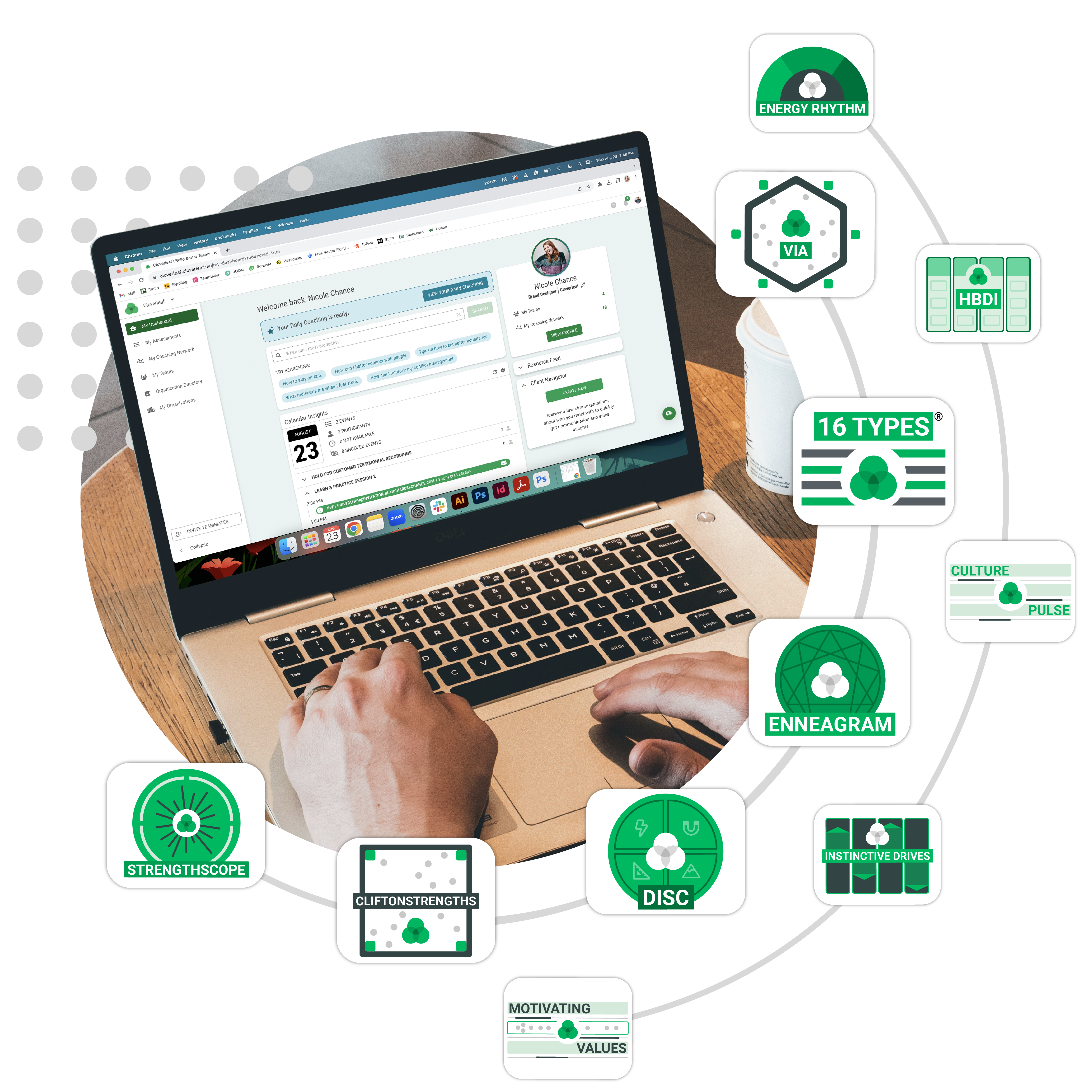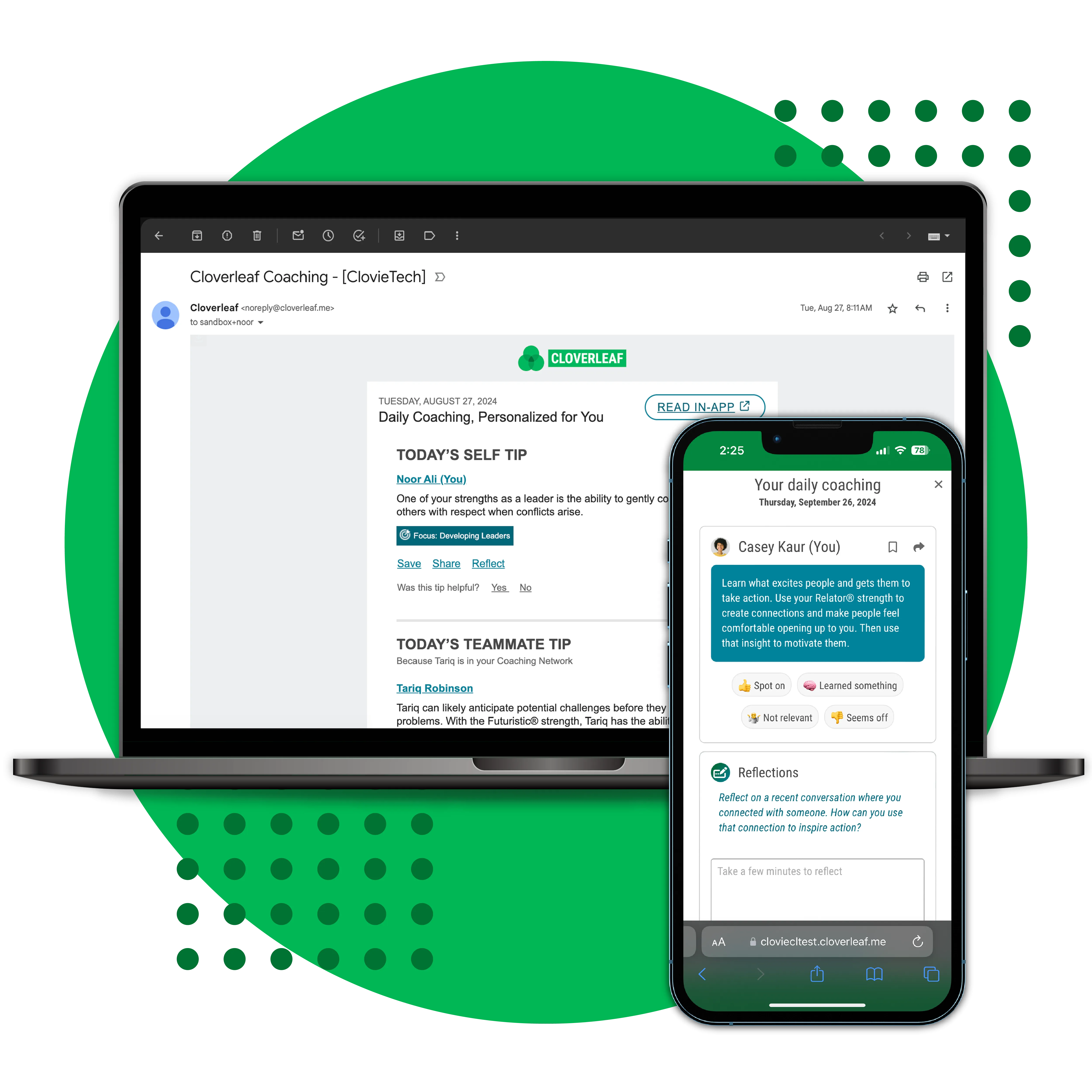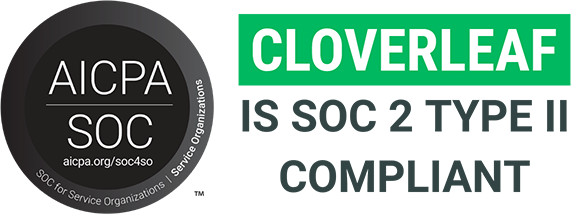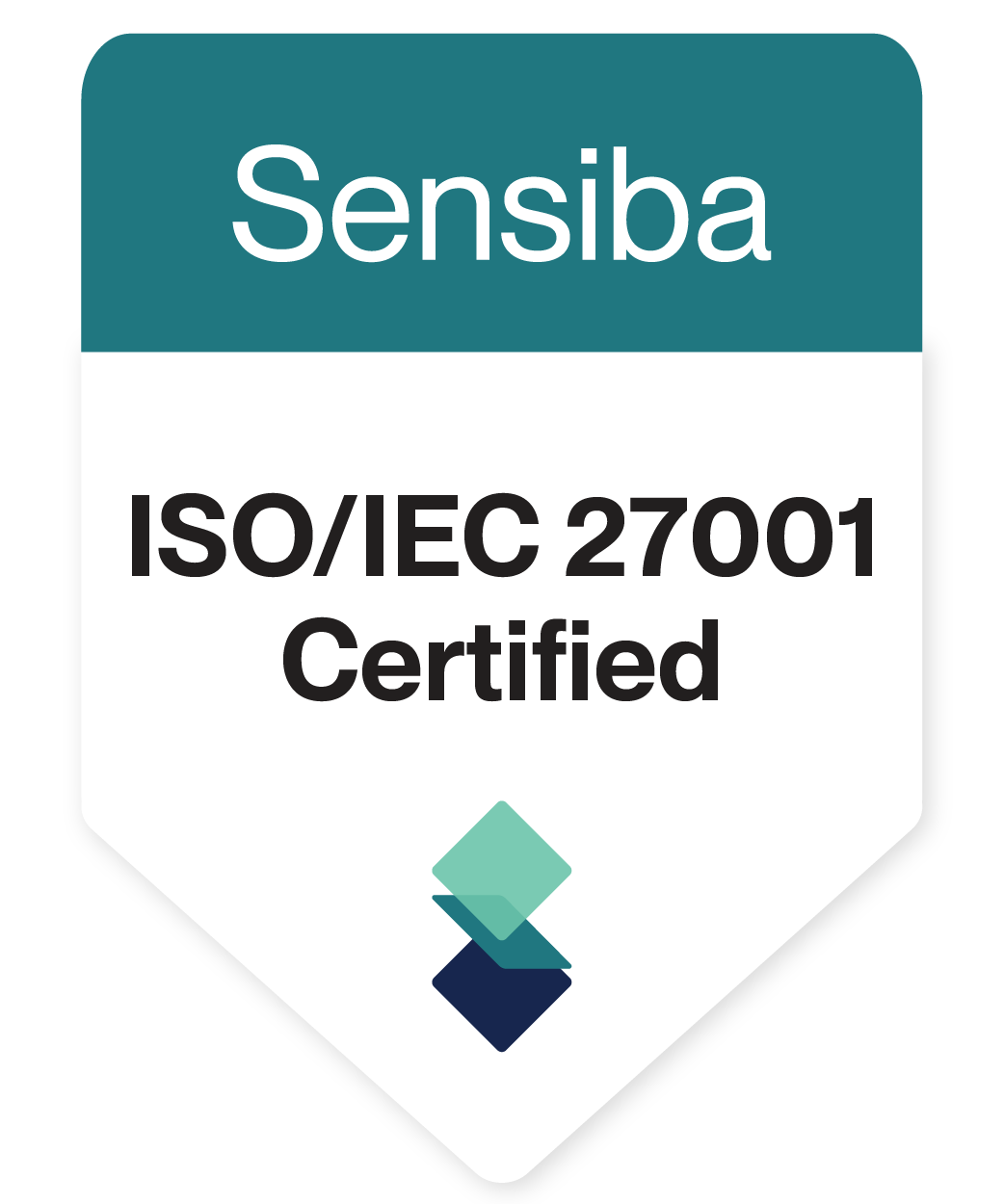The coaching market is more crowded than ever. Tools. Frameworks. Platforms. All promising transformation through assessments.
But too often, assessment-based coaching delivers a static report, a debrief session, and then stops. Insight is treated as the finish line, not the starting point.
At the same time, coaches are facing pressure to show measurable outcomes. Not just spark self-awareness. Not just generate buy-in during a session. But to help clients shift how they communicate, collaborate, and lead consistently, over time.
Because identifying a personality type or work style is only the beginning. Coaching is about helping people navigate tension, lead under pressure, and make better decisions in the moments that matter most to them and the organization.
Evidence-based coaching can shape how you nurture relationships and deal with difficult situations in both your personal and professional life. — Forbes Coaches Council, 2021
The problem is not the assessments. It’s how they’re used.
Most coaching engagements treat assessments like a diagnostic report—something you review once, maybe twice, and then file away. They become static snapshots: interesting, even accurate, but disconnected from the day-to-day work of leading, collaborating, and making decisions under pressure.
But leadership isn’t static. Neither is growth. And when assessment insights aren’t revisited, re-applied, or embedded into a client’s real environment, their value fades fast.
Assessments don’t drive change. Application does.
Get the High Impact Coach Crash Course to see how to build a coaching business that delivers more value, serves more clients, and grows more revenue without burning you out.
Where Most Assessment Based Coaching Stops Short
Too often, assessments are treated like a coaching event, not a coaching tool. A client takes a test. A coach walks them through the report. There’s a moment of clarity—maybe even a breakthrough. And then?
Nothing.
The report gets filed away. The insight fades. And the very behavior the coaching aimed to influence—communication style, conflict management, decision-making—goes unaddressed when it matters most.
This is the shortfall of most coaching models: they front-load insight, but leave no structure for applying it in the flow of work. No reminders before high-stakes meetings. No reinforcement after difficult feedback. No way to translate self-awareness into daily leadership practice.
That’s not a coach problem—it’s a tool problem.
Most tools deliver insight. But they don’t help you use it on a Thursday at 2 p.m. when your calendar’s packed and you’re about to walk into a hard conversation.
And it puts pressure on coaches to compensate.
To remember every detail of a client’s report.
To translate static data into live feedback.
To become the expert in every model, on top of being the guide, the challenger, the strategist.
It’s not sustainable. And it’s not necessary.
Static reports don’t change behavior. Coaching does.
But only when the coaching environment makes it easy for people to apply what they’ve learned.
Clients need more than self-insight—they need in-the-moment support.
Coaches need more than assessments—they need tools that move with the client, not behind them.
Because leadership isn’t theoretical. Neither is growth. And a coaching strategy built around a one-time assessment will always fall short.
What Assessment-Based Coaching Should Make Possible
Assessment-based coaching should begin with insight, but it can’t end there.
The assessment isn’t the deliverable. It’s the launchpad. A catalyst for development that unfolds over time, not a one-time snapshot meant to explain someone’s behavior forever.
Great coaching uses assessments to open the door to deeper context, not to define the client, but to better understand the patterns beneath how they work, communicate, and lead.
That’s why layered assessments matter. Not because they’re comprehensive on their own, but because each one adds a different lens:
- DISC shows how someone communicates under pressure.
- Enneagram reveals what drives them and where their blind spots may show up in conflict or change.
- 16 Types surfaces how they prefer to process information, make decisions, and structure their work.
Used together, these tools offer a multi-dimensional understanding of a client’s behavior—rich enough to coach from, flexible enough to grow with.
But insight alone still isn’t enough.
To make coaching stick, assessments need to move with the client. That means surfacing reminders in real time—before a tough 1:1, after a heated meeting, in the lead-up to a feedback conversation. This is when people are actually making choices about how to show up.
And here’s the shift most overlooked:
Assessment based coaching should not be restricted by needing to teach about teaching the tool. It’s about equipping the client to use it without you.
When coaching becomes too dependent on the coach for translation, it limits the client’s autonomy. But when insight is delivered in context, in plain language, in real moments, it empowers the client to take the lead in their own growth.
The coach still guides, challenges, and holds the thread. But the work of change becomes shared. Embedded. Ongoing.
That’s what assessment-based coaching should do:
Make growth easier. Make insight more useful. And make behavior change a daily, doable practice—not a lofty goal.
Scale Your Coaching Business Without Adding More Hours
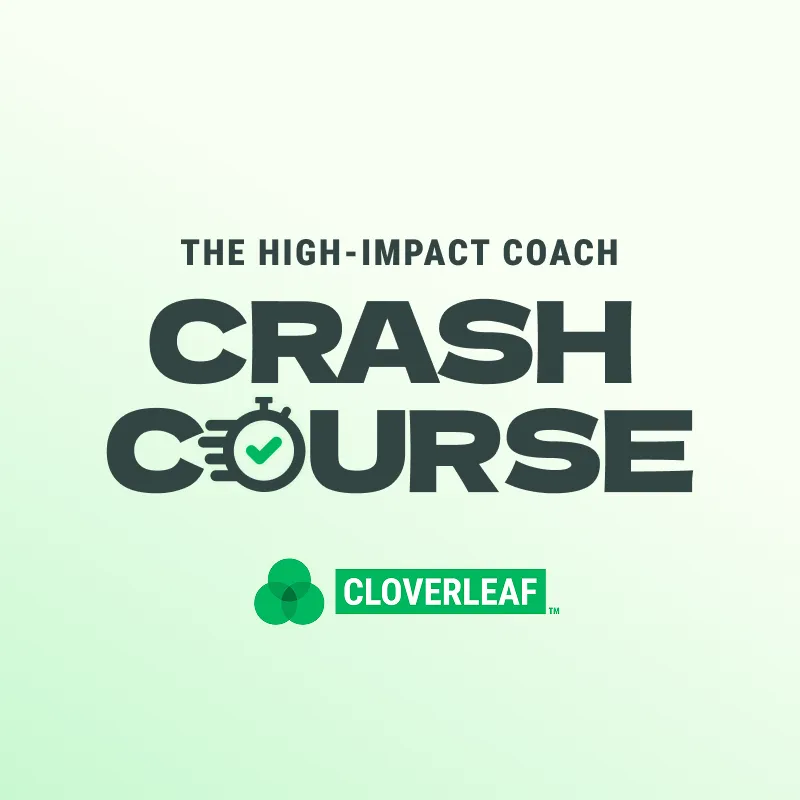
The Role Of Insight And Context In Development
Theory doesn’t change behavior. Context does.
That’s why assessment-based coaching only becomes powerful when it shows up in the moment—not just in the debrief.
Here’s what that looks like when it works:
👉 A client is preparing to give tough feedback to a direct report. As they review their calendar, a nudge appears—reminding them how their Enneagram type tends to respond to conflict, and what to be mindful of when stress is running high.
👉 A cross-functional team meeting is on the horizon. Tension has been building between departments. As the team lead prepares, DISC insights resurface in their inbox, offering tailored suggestions on how to adapt communication styles across different personality profiles.
👉 Midweek, decision fatigue is setting in. A product manager receives a timely tip connected to their 16 Types profile, highlighting the blind spots they may fall into when pressure rises and clarity fades. It’s just enough of a reminder to pause, reflect, and course-correct before moving forward.
These aren’t teaching moments. They’re coaching moments, the kind most platforms miss, and the kind most clients remember.
Because insight is only useful when it can be applied. And coaching is most impactful when it meets people in the messy, unscheduled parts of their day, not just in the session where reflection happens.
The Myth of “More Certifications = More Value”
If you’re a coach, you’ve likely felt it: the pressure to become an expert in every tool your clients might encounter.
Another framework. Another certification. Another acronym to add to your name.
But here’s the truth: clients aren’t hiring you for your credentials. They’re hiring you for your ability to help them lead better.
Clients don’t need you to teach the Enneagram. They need you to help them navigate tension with their team.
They don’t need a deep dive on DISC theory. They need to give feedback that lands.
They don’t need your mastery of 16 Types—they need your perspective on how they make decisions under pressure.
Today’s best assessment platforms don’t require deep certification to be useful. They provide just enough context to prompt meaningful reflection—and leave room for the coach to do what they do best: ask the right question at the right time.
Because great coaching isn’t about memorizing every assessment model.
It’s about helping a client move from insight to action, without getting lost in the complexity of the tool.
That’s the shift. From expert explainer to trusted facilitator.
From carrying the tool, to using it wisely, and letting it serve the conversation, not control it.
The Role of Coaching Technology And Assessments
Coaching doesn’t happen once. It happens over time.
But time is exactly what most coaches—and clients—don’t have enough of. Sessions are powerful, but they’re finite. And insight without reinforcement tends to fade, no matter how impactful the conversation was.
That’s where technology comes in.
Not to replace the coach. But to reinforce the insight.
Technology can do what humans can’t:
- Show up every day
- Deliver reminders at just the right time
- Surface the right insight in the flow of work, not outside of it
When coaching nudges appear in tools your clients already use—Slack, email, calendars—they don’t feel like an interruption. They feel like an extension of the coaching itself.
And because those nudges are written by coaches and behavioral experts, not algorithms, they maintain the tone, nuance, and humanity that makes coaching meaningful in the first place. The tech simply curates what matters, and when.
This is what makes change stick.
Behavior change doesn’t happen in a single session. It happens in the moments between, when a client has a choice to respond with awareness or default to habit.
Technology makes those moments easier to reach.
Coaching makes those moments easier to navigate.
And together, they make development something people live, not just talk about.
How Cloverleaf Uses Assessments To Enhance Coaching
The best coaching tools don’t take center stage. They stay behind the scenes—supporting the coach, serving the client, and reinforcing growth when it matters most.
That’s exactly what Cloverleaf is built to do.
Cloverleaf layers insights from multiple assessments—DISC, Enneagram, 16 Types, and more—to give coaches a fuller picture of who their clients are, how they show up, and where they tend to get stuck. But it doesn’t stop at insight.
Because coaching that sticks needs more than context. It needs timing.
That’s where Cloverleaf’s nudges come in. Short, contextual tips delivered straight into the tools your clients already live in—Slack, email, calendar. They surface in real moments, when coaching is most likely to drive behavior change.
You don’t need to memorize the Enneagram or become a certified DISC facilitator. Cloverleaf simplifies the science so you can focus on the conversation, the question, and the relationship.
It’s not about doing more.
It’s about doing what you already do—with more clarity, more relevance, and more consistency.
The Future of Assessment Based Coaching Is Behavior-Based
The value of assessments doesn’t come from the data itself. It comes from what your clients do with it.
Insight is the beginning—but it’s not the result. The real work of coaching starts after the debrief, in the everyday moments where growth is tested: when someone gives feedback instead of avoiding it, pauses instead of reacting, or adapts their approach based on what the team actually needs.
That’s where assessments become coaching tools, not just personality labels.
That’s where behavior shifts. And that’s where real development happens.
When coaching moves from static to dynamic—when it lives beyond the report and shows up in the work—coaches become essential partners in transformation. Not just service providers. Not just session leaders. True guides for growth.
Assessment-based coaching doesn’t need more frameworks. It needs more effective ways to reinforce coaching and initiate behavior change.
And that’s the future Cloverleaf is helping coaches build.
🙋 FAQ
Q: Do I need to be certified in every assessment to use Cloverleaf?
A: No. Cloverleaf gives you ready-to-use insights across DISC, Enneagram, 16 Types, and more—so you can coach with depth, without adding extra credentials. The science is built in. You focus on the person in front of you.
Q: Won’t this feel automated or impersonal to my clients?
A: Actually, the opposite. Nudges are personalized to your client’s unique assessment profile and show up in the tools they already use. The result? More relevant coaching moments—without more meetings.
Q: How does this help me retain clients longer?
A: When your coaching is felt daily—not just during sessions—clients stay more engaged and see more value. That leads to better results, stronger relationships, and more referrals.
Q: Can I track whether my clients are actually using these insights?
A: Yes. Cloverleaf’s dashboards give you a window into what’s resonating—so you can tailor your coaching based on real engagement, not just intuition.



